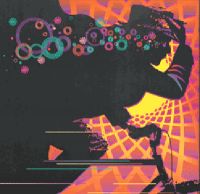If I were Jonathan Ott, I would have translated Albert Hofmann's "LSD - My Problem Child" differently, and perhaps would not have lost the fact that Albert Hofmann's unnamed "assistant" on the fateful Bicycle Day was actually a
woman.
Before I report it to the English-speaking audience, I'm warning you:
caution, feminism! OK, here we go.
What would have happened on Bicycle Day without Hofmann's assistant? What if the researcher got lost in the fields or if some accident occurred at home? The assistant, by the very meaning of the noun a secondary figure, turns out to be more important than it seems. Maybe it would be nice to know who he was, to praise him for having protected Hofmann and the Discovery? But he was most certainly not a "he." From the German:
"Ich konnte nur noch mit größter Anstrengung verständlich sprechen und bat meine Laborantin, die über den Selbstversuch orientiert war, mich nach Hause zu begleiten." (Hofmann, "LSD - mein Sorgenkind", Munich 2004, page 29).
Fragments in bold reveal the detail: the assistant's gender as a woman. And for me women's presence in culture has become an intellectual obsession, I immediately fall into some feminist euphoria when I see some part of culture, claimed to be a man's world, pulsating with women's forgotten existence. OK, you have been warned.
Further everything is dissolving into a shimmering haze... An imaginary image of the assistant racing through the fields, hardly keeping pace ("my assistant later told me that we had traveled very rapidly"), summoning the doctor and probably Anita Hofmann ("Late in the evening my wife returned from Lucerne. Someone had informed her by telephone that I was suffering a mysterious breakdown"), probably sitting somewhere close during almost the whole experiment, her face obscured by darkness, disappearing into the shadow of time... Maybe those who say that women have a "psychedelic consciousness" are in some paradoxical way right; we certainly don't need a psychedelic to dissolve, every day we dissolve into a culture which isn't our home, our traces disappear, only wet soil remains for future archaeologists of women's history.
A photocopy of Hofmann's report reveals the assistant's name: "
Miss Ramstein". That's all we know. How to turn a shred of personal data into an image of a living woman, tear her out of the time that's obscuring the view?
Who was she? What did she feel when breaking on through towards a professional career of her own in a world which still wasn't sure if girls really needed knowledge? Was she happy to be living in a country which at least was one of the pioneers of academic education for women? What did she feel about being deprived of electoral rights and did she live up to the day they were awarded to women? Didn't she feel helpless when the situation forced her to become the first ever sitter during an LSD trip? Has she ever tried this substance herself?
Who was the first woman to take a trip into this Unknown? Some day I'll find out!
So, that was a piece of "psychedelic women's studies", also described by others as my "linguistic detective work". Was it important? For Ott surely not enough, since he didn't build any translated sentence in a way that would allow some little "she" or "her" somewhere. I don't believe in universally valid points of view, I just wanted to remind everyone of a fact I consider important. Standing somewhere in the distance, as both a feminist and a psychedelic theorist, I can surely see some facts in a different way. But maybe a dialog of these different views is the way towards understanding.
Feel free to comment!
[NOTE: This essay was originally titled "The Joys of Speaking German"]






















[link]
"In the session of January 10, 1957, I remembered telling Sid Cohen that I felt that LSD was a therapeutic drug, and that there were profound therapeutic implications to be examined with respect to its use." In '57, was anyone else (in Academia, at least) working on alternatives to the psychomimetic model of research? I think Betty was either the first or one of the very few early researchers to suggest another way, or at least the first to test one. She writes, "Little did I know though, what I was getting into when I agreed to serve as the first subject (as far as we knew) to test the possible therapeutic potential of LSD. " Pretty cool, huh? Although she probably wasn't the first female to take LSD, she was one of the very first individuals, male or female, to do something useful with it!
The comments posted here do not reflect the views of the owners of this site.